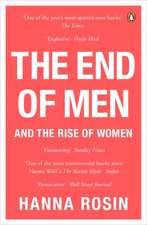Visible Histories, Disappearing Women – Producing Muslim Womanhood in Late Colonial Bengal
Autor Mahua Sarkaren Limba Engleză Paperback – 24 apr 2008
Preț: 300.45 lei
Nou
Puncte Express: 451
Preț estimativ în valută:
57.49€ • 62.70$ • 48.48£
57.49€ • 62.70$ • 48.48£
Carte tipărită la comandă
Livrare economică 24 aprilie-08 mai
Preluare comenzi: 021 569.72.76
Specificații
ISBN-13: 9780822342342
ISBN-10: 0822342340
Pagini: 352
Dimensiuni: 156 x 228 x 15 mm
Greutate: 0.48 kg
Editura: MD – Duke University Press
ISBN-10: 0822342340
Pagini: 352
Dimensiuni: 156 x 228 x 15 mm
Greutate: 0.48 kg
Editura: MD – Duke University Press
Cuprins
Acknowledgments ix
Introduction: Writing Difference 1
1. The Colonial Cast: The Merchant, the Soldier, the "Writer" (Clerk), Their Lovers, and the Trouble with "Native Women's" Histories 27
2. The Politics of (In)visibility: Muslim Women in (Hindu) Nationalist Discourse 48
3. Negotiating Modernity: The Social Production of Muslim-ness in Late Colonial Bengal 78
4. Difference in Memory 133
Conclusion: Connections 196
Notes 205
Bibliography 287
Index 331
Introduction: Writing Difference 1
1. The Colonial Cast: The Merchant, the Soldier, the "Writer" (Clerk), Their Lovers, and the Trouble with "Native Women's" Histories 27
2. The Politics of (In)visibility: Muslim Women in (Hindu) Nationalist Discourse 48
3. Negotiating Modernity: The Social Production of Muslim-ness in Late Colonial Bengal 78
4. Difference in Memory 133
Conclusion: Connections 196
Notes 205
Bibliography 287
Index 331
Recenzii
Visible Histories, Disappearing Women is an analytically insightful, genuinely original work that breaks new ground in South Asian history, gender, and womens studies, postcolonial theory, and historical sociology. One of its strengths is Mahua Sarkars insistence that history as a discipline and feminism as a politics have disappeared the Muslim woman as a subject. Antoinette Burton, editor of Archive Stories: Facts, Fictions, and the Writing of HistoryMahua Sarkars insightful study of Bengali Muslim womens writings and oral testimonies is not a simple project of reclaiming the history of marginalized subjects. The point of her thoughtful and penetrating analysis is to illuminate the structures of representationin both official histories and popular memoriesthat produce the specific ways in which the figure of the Muslim woman becomes visible. Sarkar exposes the nation-centered focus and the liberal-feminist politics that have shaped the specific marginalization of Muslim women in accounts of late colonial Bengal. Hers is ultimately a passionate and nuanced call for a re-orientation of existing scholarship with far-reaching implications for the contours both of historiography and of contemporary politics.Mrinalini Sinha, author of Specters of Mother India: The Global Restructuring of an Empire
Notă biografică
Mahua Sarkar is Associate Professor of Sociology and a faculty member of the Women's Studies and Asian and Asian-American Studies programs at Binghamton University.
Textul de pe ultima copertă
""Visible Histories, Disappearing Women" is an analytically insightful, genuinely original work that breaks new ground in South Asian history, gender and women's studies, postcolonial theory, and historical sociology. One of its strengths is Mahua Sarkar's insistence that history as a discipline and feminism as a politics have disappeared the Muslim woman as a subject."--Antoinette Burton, editor of "Archive Stories: Facts, Fictions, and the Writing of History"
Descriere
Representations of Muslim women in colonial India










